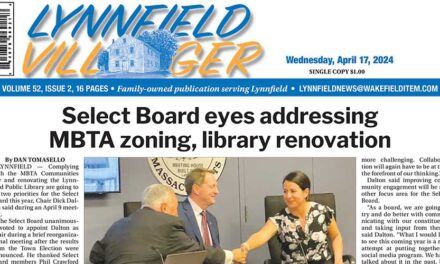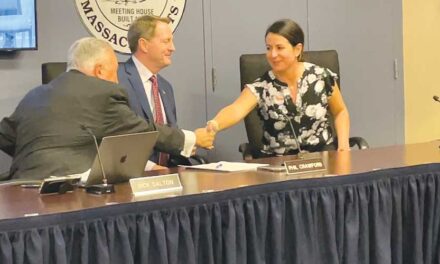By MAUREEN DOHERTY
LYNNFIELD — A public forum on the future use of the historic Centre Farm generated some interesting talking points but no immediately viable potential uses for the seven-acre site in the town center.
That was the assessment on the forum given to the Villager by Capital Facilities Advisory Committee (CFAC) Chairman Ted Caswell, who had appealed to the public in the four weeks leading up to the March 23 forum that this was their opportunity to assemble draft proposals and make their best pitch. In return, the CFAC and the town would work together with the proponent to get it done.
Caswell said about a dozen people showed up as “concerned citizens” but only two had proposals.
“It was a business discussion and it was more of a bigger picture discussion than a detailed use of how that property could be used,” Caswell said.
For instance, local attorney Michael Walsh submitted a very detailed multi-step nine-page proposal that had some “intriguing concepts” but would take many years to become viable.
He said another local attorney, John Kimball, proposed rezoning portions of the town center for a limited business zone that would make a combination of residential and commercial use of properties like Centre Farm possible, such as using the barn for a construction or architectural firm, to bring a higher value to the property.
Still another resident, Kendall Inglese, had a proposal but Caswell said she was not prepared to discuss it or hand it out. “It was in her computer,” he said, adding she had believed an overhead projector would be available for her to use at the forum.
According to Caswell, Planning Board member Alan Dresios told the CFAC members that the Planning Board has hired a consultant to explore how to slow down traffic in the center and “the options there might be for long-term safety of that center. There are different means to slow some of the traffic down as it goes through the center,” Caswell said. The study was funded by a grant to be done this summer.
“It is all tied to the bigger picture of Lynnfield. It wasn’t necessarily focused on the farm. That’s how the meeting went,” Caswell said.
From the get-go the town took ownership of the Centre Farm by a vote of a Special Town Meeting June 30, authorizing $1.55M for it, with the long-term view of attaching deed restrictions that would prevent a private homeowner from subdividing it. Two more house lots are available by right because 567 Main St. has the required frontage and area for two more homes.
However, a new glitch was raised during the March 23 meeting, Caswell said — that such deed restrictions only last 30 years.
“Although that sounds like a big number it’s really not when you are looking at historic preservation. I just know what the lawyers have told me. Whether you can extend that, it didn’t sound like a possibility but I don’t know,” Caswell said.
“There were other conversations on whether the town holds it and utilizes some of the land in different ways, such as splitting off both cemeteries, so that ultimately that deed restriction may expire on the building but it certainly won’t allow development of additional homes,” Caswell said.
By far the most interesting plan was Walsh’s, he said. “He’s talking about filling in the wetlands on the back of the farm to give us six acres of useable land in the center,” Caswell said. “I am assuming it’s possible but how long it would take? What amount of money and what process? I don’t know.”
Caswell said under the Walsh proposal “some of that fill would come from King Rail, shutting that facility down and building potential housing there.” The funds generated from the sale of that housing could generate $12M to pay down town debt, according to the proponent, Caswell said.
“If some of it could be tweaked it is really not a bad idea; it would actually make a lot of sense. But, who is going to take a hold of that and run with it?” he said, adding he appreciated the considerable “time and effort that Walsh put into it and the thought process.”
From a committee point of view, Caswell said “no options have been brought forward. We only have another year to come up with a theoretical solution. I don’t see any viable solution time-wise at this point.”
“For me, the next step is to get an appraisal, both commercially and residentially, so we understand fully what that property is worth. Then we throw some deed restrictions on it.”
Caswell believes the return on the town’s investment “will definitely be less that what we paid because of the deed restrictions.”
Asked if that was the price the town had paid to preserve other property values in town, he agreed. “Absolutely, that’s what we voted for. Can the town hold it for another 10 years? Yes. But the longer it sits with nothing going on, the worse it is going to get.”




